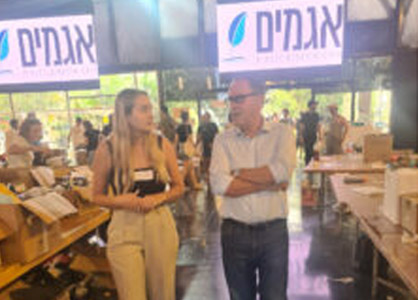
BGU Initiates Project to Eliminate Intestinal Worms in Ethiopia
BGU Initiates Project to Eliminate Intestinal Worms in Ethiopia
August 7, 2008
Medical Research, Negev Development & Community Programs, Press Releases
NEW YORK, August 5, 2008 – A professor at the Faculty of Health Sciences at Ben-Gurion University of the Negev (BGU) is beginning an intensive program in Ethiopia this August to eradicate intestinal worms which affect as much as 50 percent of the population in Africa.
BGU Professor Zvi Bentwich, who heads the Center for Emerging Diseases, Tropical Diseases and AIDS in Israel (CEMTA), believes there is a possible connection between the AIDS epidemic in Africa and intestinal worms, one of the many Neglected Tropical Diseases (NTDs) which affect nearly one quarter of the world’s population.
Prof. Bentwich believes that intestinal worms can affect the immune system in such a profound way that it has a major impact on one’s susceptibility to HIV and tuberculosis, and in coping with these diseases when they are already there.
“As head of the largest AIDS center, I dealt with a large number of Ethiopian HIV and AIDS patients, and through them became aware of the magnitude of this problem in Ethiopia,” he says.
The first stage of the operation to deworm about 30,000 people from three separate locations in Ethiopia begins in August. In the fall, the research project will focus on the town of Mekele in northern Ethiopia with approximately 250,000 inhabitants.
The program combines the provision and administration of antihelminthic medications, a few pills every four to six months, with hygiene education and information on how to protect populations from exposure to the parasites.
“NTDs are one of the most evident hallmark signs of poverty and neglect, significantly contributing to the persistence of this situation in a very large number of countries in Africa, Asia and South America,” Bentwich explains.
“They have been largely neglected by the Western developed countries, since they are practically nonexistent there. It costs much less than what it takes to fight the more recognized epidemics like AIDS, tuberculosis and malaria.”
BGU is partnering with Global Network for the Fight against Neglected Tropical Diseases to help populations across Africa, including Ethiopia. The project is being funded by an international coalition of nonprofit organizations.
ABOUT AMERICANS FOR BEN-GURION UNIVERSITY
By supporting a world-class academic institution that not only nurtures the Negev, but also shares its expertise locally and globally, Americans for Ben-Gurion University engages a community of Americans who are committed to improving the world. David Ben-Gurion envisioned that Israel’s future would be forged in the Negev. The cutting-edge research carried out at Ben-Gurion University drives that vision by sustaining a desert Silicon Valley, with the “Stanford of the Negev” at its center. The Americans for Ben-Gurion University movement supports a 21st century unifying vision for Israel by rallying around BGU’s remarkable work and role as an apolitical beacon of light in the Negev desert.
About Ben-Gurion University of the Negev
Ben-Gurion University of the Negev embraces the endless potential we have as individuals and as a commonality to adapt and to thrive in changing environments. Inspired by our location in the desert, we aim to discover, to create, and to develop solutions to dynamic challenges, to pose questions that have yet to be asked, and to push beyond the boundaries of the commonly accepted and possible.
We are proud to be a central force for inclusion, diversity and innovation in Israel, and we strive to extend the Negev’s potential and our entrepreneurial spirit throughout the world. For example, the multi-disciplinary School for Sustainability and Climate Change at BGU leverages over 50 years of expertise on living and thriving in the desert into scalable solutions for people everywhere.
BGU at a glance:
20,000 students | 800 senior faculty | 3 campuses | 6 faculties: humanities & social sciences, health sciences, engineering sciences, natural sciences, business & management, and desert research.
For all press inquiries, please contact:
James Fattal, J Cubed Communications
516.289.1496



